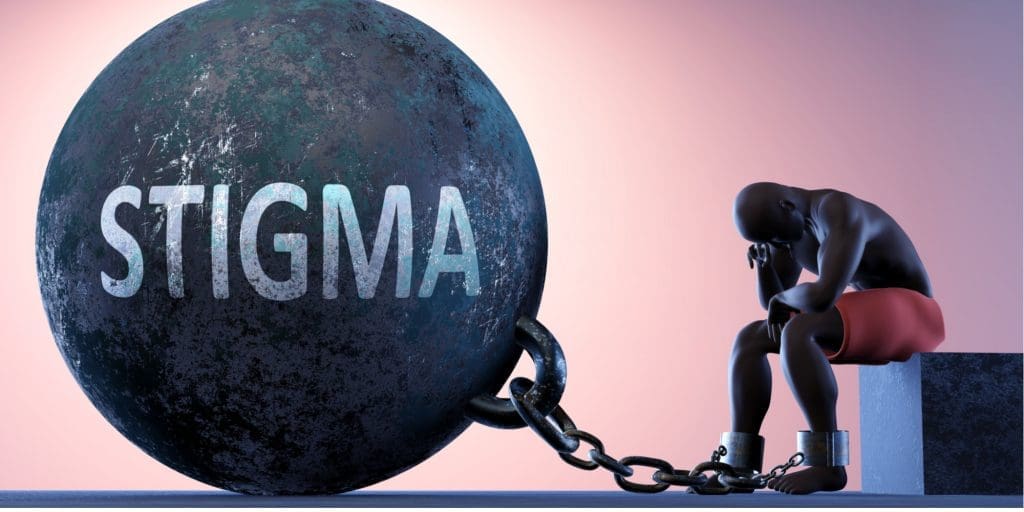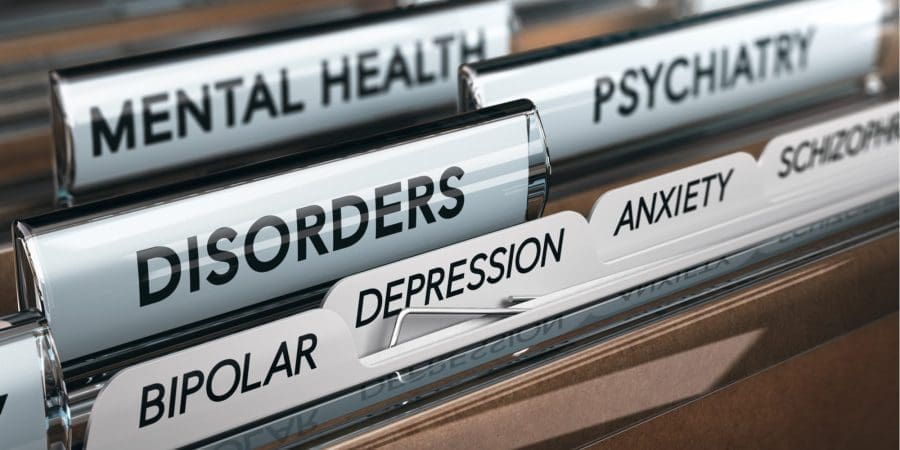Mental illness stigma is something that affects everyone, whether you have a mental health condition yourself or love someone who does. The symptoms of mental illness can make it hard enough to get help, but the stigma of mental illness makes it even harder to reach out to friends and family. And without that critical support, mental illness symptoms often only go worse.
This doesn’t just harm personal relationships, either. Many people find themselves experiencing career troubles due to mental illness, whether that be frequently missing work or just not being able to focus. As work problems go, so does stress, and this only serves to worsen mental illness symptoms.
The good news is that mental health stigma doesn’t have to dictate how you live your life. There are ways you can overcome the stigma around mental illness, which starts with better understanding mental illness stigma and where it comes from.
What Is Mental Illness Stigma?

What is stigma in mental health? In short, stigma involves others seeing you in a negative way because of your condition. Most commonly it involves the belief that those who have a mental illness do not suffer from a health condition, but some fault of character. It’s the belief that mental illness is self-imposed and you should be able to avoid or fix your illness by using will alone.
And while it’s admirable to not let the opinions of others dictate your life, most people struggle to ignore the effects of mental illness stigma. Stigma from parents, friends, and other close relations can make you feel like your mental health is something you need to maintain on your own, which in turn can prevent you from getting the help you need when you need it.
Importantly, you need to know that mental illness is not a choice or a personality flaw. You are not a bad person for having a mental health issue, and the responsibility is not on you to suddenly stop feeling what you feel. Rather, you have a responsibility to look after yourself, and the easiest way to do that is to work with mental health professionals.
If you’re still struggling to fight the mental illness stigma you’re facing, use these strategies to boost your confidence and get the help you need.
1. Update Your Language
How you talk about mental illnesses matters, and how you hear others talking about mental illness matters too. Casually referring to yourself as “crazy” for experiencing a bout of depression or anxiety may feel lighthearted, but it’s actually a way of dismissing your feelings. And if you notice that every killer in television dramas shares your diagnosis of schizophrenia, it can make you feel like there is no path forward to a happy life for you. All of these serve to isolate you, so it’s important to consider what you’re saying, as well as what kind of language and stereotypes you’re seeing in daily life.
In addition to replacing inaccurate phrases from your vocabulary, you should surround yourself with people who are willing to do the same, and perhaps stop indulging in shows that don’t show respect for people like you. These life changes can be hard, but they can also go a long way in helping combat mental illness stigma in everyday life.
2. Seek Treatment
Although it can be scary, one of the best ways to fight the stigmatization of mental illness is to face it head-on by getting help. Often, the more information you have, the less scary mental illness seems. And what better way to learn about mental illness than to have professionals work with you on your mental health?
An adult psychiatric program is designed to apply comprehensive, well-rounded to treat a variety of mental health issues, which can include diagnosing issues, managing symptoms, and helping you confront mental illness stigma. Not only will you be encouraged to take your mental health seriously, but the therapists, doctors, and other patients you interact with can provide you with advice on combating stigma in your everyday life.
3. Combat Self-Stigma
Although mental illness stigma from others can be hard to overcome, it’s even more difficult to overcome self-stigma. When you constantly see certain messages about people with mental health conditions, you might internalize those messages and make them part of your personal narrative. In this way, self-stigma is characterized by your own negative thoughts and attitudes about your mental illness, which often translate to a negative outlook about yourself as a person.
This is one of the many reasons why seeking help from a mental health program is so helpful. Not only can therapists help you manage your condition, but they can also help you change your thought patterns so that you don’t beat yourself up for having a mental health condition.
4. Research People Who Have Mental Health Challenges
When you’re facing mental health stigma, it can be extremely helpful to know you aren’t alone. Spend some time researching celebrities who have been outspoken about their mental health challenges. Contrary to popular belief, mental illness and a happy life are not mutually exclusive. When you take care of yourself and get the help you need, you can do the things that matter to you. That’s the key benefit of recognizing that you are not alone in your situation.
You can also gain a lot from researching and following everyday people who struggle with mental illnesses. Follow social media accounts that fight mental health stigma so you can see that struggling with a mental illness isn’t something to be ashamed of.
5. Join a Support Group

It can be extremely helpful to know you aren’t alone when dealing with mental health challenges, but researching celebrities and following social media accounts will only get you so far. If you really want to fight stigma, you should join a group where you’re able to interact with other people facing the same challenges you’re facing.
While meeting with other people can be dicey right now due to the coronavirus, there are plenty of online support groups for people with mental illnesses. You can talk about ways others experienced stigma, and you can get their advice on how they deal with stigma. It just may give you the strength to continue seeking help and to raise your voice whenever you see stigma in action.





















